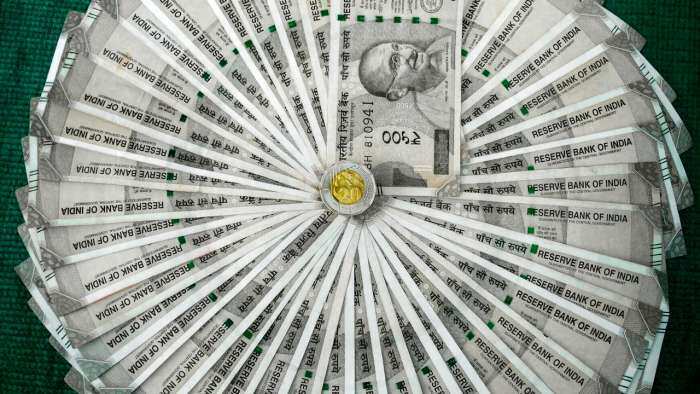Red October rumbles on as U.S. bond yields reach 5%
The traditional driver of world borrowing costs - the 10-year U.S. Treasury yield - had retreated to 4.93% but with oil back above $93 a barrel and Israel looking like it was gearing up for a full-scale invasion of Gaza, the mood was fraught.
)
Red October rumbled on in world markets on Friday as the sight of U.S. government bonds yields hitting 5% for the first time since 2007 amid an increasingly threatening conflict in the Middle East left investors searching for safety.
The traditional driver of world borrowing costs - the 10-year U.S. Treasury yield - had retreated to 4.93% but with oil back above $93 a barrel and Israel looking like it was gearing up for a full-scale invasion of Gaza, the mood was fraught.
Europe's share markets dropped 1%. Asia stocks had fallen to an 11-month low overnight and futures markets pointed to another slip on Wall Street, which has lost 2% over the last two days.
The Bank of Japan had intervened in its bond markets too as the 10-year JGB yield touched a decade high, while the scramble for safety pushed gold to a 3-month top and kept both the dollar and Swiss franc well supported.
"The fact that there was little pullback in bond yields in the past 48 hours despite the S&P 500 slipping over 2% and the VIX Index closing at over 21 for the first time since March is very disconcerting in my view," RBC Capital strategist Alvin Tan said, referring to one of main global market fear gauges.
A slump in Tesla shares after Elon Musk warned of demand worries wasn't helping the mood either in Europe where shares were facing a 3% loss for the week and borrowing costs were heading for their steepest weekly rise since July.
The European Central Bank meets next week and is expected to keep its rates on hold after 10 consecutive increases but for now markets were focused on other issues.
Federal Reserve chief Jerome Powell had said on Thursday that he agreed "in principle" that the recent jump in bond yields might "at the margin" lessen the need for more rate hikes, but also stressed the strength of the economy.
SUBMERGING MARKETS
The Middle East troubles and rising global borrowing costs meant emerging market stocks were at an 11-month low as was MSCI's main Asia Pacific index.
Tokyo's Nikkei had finished 0.5% lower on the day and -3.2% for the week which only just short of being its worst week of the year.
Data out of Japan had showed core inflation in September slowed below the 3% threshold for the first time in over a year.
China's blue chips and Hong Kong's Hang Seng both dropped 0.7%. too. China on Friday had held its benchmark lending rates steady following some signs of stabilisation in the economy this week.
The U.S. dollar was within a hair's breadth of the closely watched 150 yen level at 149.84 yen. It was up 0.1% against its main global peers at 106.34, not too far from an 11-month top of 107.34 hit in early this month.
Quincy Krosby, chief global strategist at LPL Financial, said focus was intensifying on the U.S. fiscal deficit because of the larger defence funding needs for Washington.
U.S. President Joe Biden on Thursday asked Americans to spend billions more dollars to help Israel fight Hamas, with mounting expectations that Israeli forces will mount a ground invasion of Gaza imminently.
A U.S. Navy warship intercepted three cruise missiles and several drones launched by the Iran-aligned Houthi movement from Yemen potentially toward Israel. A U.S. base in Iraq had also came under attack Washington said.
"There are several reasons why investors would want to sell this market, while very few to buy. That's what we've seen today as risk sells off," said Kyle Rodda, senior financial market analyst at capital.com.
"To put it in simplest terms, market participants don't want to be carrying risk into the weekend when hostilities could erupt."
Gold prices scaled a fresh 3-month peak of $1,990 per ounce, the highest since late July, as investors sought safe-haven assets in the turmoil.
Oil prices were headed for the second weekly gain, due to fears of an escalating regional conflict in the Middle East, which would disrupt supplies.
U.S. crude jumped 1% to $90.30 per barrel and Brent was at $93.50, up 1.2% on the day.
Get Latest Business News, Stock Market Updates and Videos; Check your tax outgo through Income Tax Calculator and save money through our Personal Finance coverage. Check Business Breaking News Live on Zee Business Twitter and Facebook. Subscribe on YouTube.
RECOMMENDED STORIES

SIP Calculation at 12% Annualised Return: Rs 10,000 monthly SIP for 20 years, Rs 15,000 for 15 or Rs 20,000 for 10, which do you think works best?

FD Rates for Rs 10 lakh investment: Compare SBI, PNB, HDFC, ICICI, and Post Office 5-year fixed deposit returns

LIC Saral Pension Plan: How much should you invest one time to get Rs 64,000 annual pension for life?

SIP Calculation at 12% Annualised Return: Rs 1,000 monthly SIP for 20 years, Rs 4,000 for 5 years or Rs 10,000 for 2 years, which do you think works best?

UPS vs NPS vs OPS: Last-drawn basic salary Rs 90,000 and pensionable service 27 years? What can be your monthly pension in each scheme?

Monthly Pension Calculations: Is your basic pension Rs 26,000, Rs 38,000, or Rs 47,000? Know what can be your total pension as per latest DR rates
03:44 PM IST











 Indian markets face strong headwinds: Analysts
Indian markets face strong headwinds: Analysts Dollar continues dream run, little stands in its way - Reuters poll
Dollar continues dream run, little stands in its way - Reuters poll Stocks stall as West considers more sanctions against Russia
Stocks stall as West considers more sanctions against Russia Asian shares bounce back, but rising US yields pose risks
Asian shares bounce back, but rising US yields pose risks